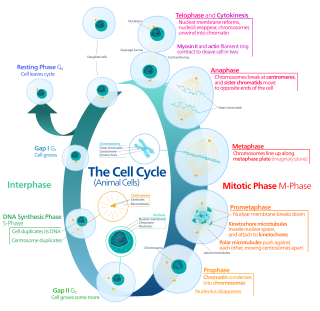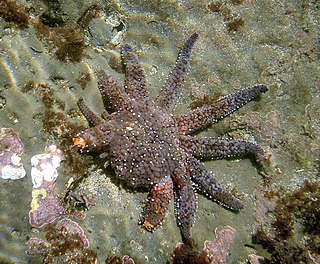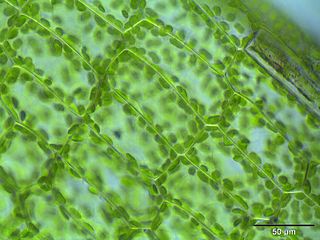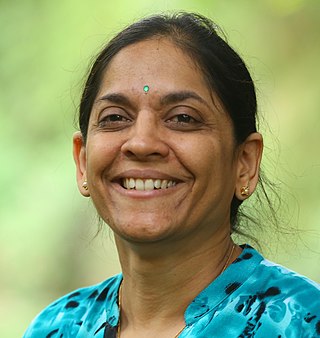
Developmental biology is the study of the process by which animals and plants grow and develop. Developmental biology also encompasses the biology of regeneration, asexual reproduction, metamorphosis, and the growth and differentiation of stem cells in the adult organism.

Planarians (triclads) are free-living flatworms of the class Turbellaria, order Tricladida, which includes hundreds of species, found in freshwater, marine, and terrestrial habitats. Planarians are characterized by a three-branched intestine, including a single anterior and two posterior branches. Their body is populated by adult stem cells called neoblasts, which planarians use for regenerating missing body parts. Many species are able to regenerate any missing organ, which has made planarians a popular model in research of regeneration and stem cell biology. The genome sequences of several species are available, as are tools for molecular biology analysis.

The G0 phase describes a cellular state outside of the replicative cell cycle. Classically, cells were thought to enter G0 primarily due to environmental factors, like nutrient deprivation, that limited the resources necessary for proliferation. Thus it was thought of as a resting phase. G0 is now known to take different forms and occur for multiple reasons. For example, most adult neuronal cells, among the most metabolically active cells in the body, are fully differentiated and reside in a terminal G0 phase. Neurons reside in this state, not because of stochastic or limited nutrient supply, but as a part of their developmental program.

Regeneration in biology is the process of renewal, restoration, and tissue growth that makes genomes, cells, organisms, and ecosystems resilient to natural fluctuations or events that cause disturbance or damage. Every species is capable of regeneration, from bacteria to humans. Regeneration can either be complete where the new tissue is the same as the lost tissue, or incomplete after which the necrotic tissue becomes fibrotic.

Elaine V. Fuchs is an American cell biologist known for her work on the biology and molecular mechanisms of mammalian skin and skin diseases, who helped lead the modernization of dermatology. Fuchs pioneered reverse genetics approaches, which assess protein function first and then assess its role in development and disease. In particular, Fuchs researches skin stem cells and their production of hair and skin. She is an investigator at the Howard Hughes Medical Institute and the Rebecca C. Lancefield Professor of Mammalian Cell Biology and Development at The Rockefeller University.

The following outline is provided as an overview of and topical guide to cell biology:

Janet Rossant, is a developmental biologist well known for her contributions to the understanding of the role of genes in embryo development. She is a leader in developmental biology. Her current research interests focus on stem cells, molecular genetics, and developmental biology. Specifically, she uses cellular and genetic manipulation techniques to study how genes control both normal and abnormal development of early mouse embryos. Rossant has discovered information on embryo development, how multiple types of stem cells are established, and the mechanisms by which genes control development. In 1998, her work helped lead to the discovery of the trophoblast stem cell, which has assisted in showing how congenital anomalies in the heart, blood vessels, and placenta can occur.
Satyajit Mayor (born 1963) is an Indian biologist. Mayor is the former director of the Institute for Stem Cell Biology and Regenerative Medicine (inStem) at Bangalore, which has a focus on the study of stem cell and regenerative biology and of the National Centre for Biological Sciences, Bangalore. Since 2024, Mayor is a Leverhulme International Professor at Warwick Medical School in the Centre for Mechanochemical Cell Biology.
Margaret Buckingham, is a British developmental biologist working in the fields of myogenesis and cardiogenesis. She is an honorary professor at the Pasteur Institute in Paris and emeritus director in the Centre national de la recherche scientifique (CNRS). She is a member of the European Molecular Biology Organization, the Academia Europaea and the French Academy of Sciences.

Helen Blau is a cell biologist and stem cell researcher famous for her work on muscle diseases, regeneration and aging. She is the Donald E. and Delia B. Baxter Foundation Professor and the Director of the Baxter Laboratory for Stem Cell Biology at Stanford University. Blau is known for overturning the prevailing view that once a cell assumes a certain specialty in the body — or differentiated state —such as a skin or liver cell, it cannot be changed. Her research established that the fate of mammalian cells can be altered. Her finding that specialized cells can be triggered to turn on genetic programs characteristic of other differentiated states provided early evidence that mammalian cellular reprogramming was possible and opened the door to the use of reprogramming in stem cell biology. Her work set the stage for the development of induced pluripotent stem cells and associated stem cell therapies.
Veena Krishnaji Parnaik is an Indian cell biologist and the current Chief Scientist at the Centre for Cellular and Molecular Biology. She obtained her Masters in Science in medicinal biochemistry from the University of Mumbai and received her PhD from Ohio State University before moving back to India to work at the CCMB. Her research is focused on understanding the functional role of the nuclear lamina and how defects in it may lead to disorders such as progeria and muscular dystrophy.
Valerie Horsley is an American cell and developmental biologist. She currently works as an associate professor at Yale University, where she has extensively researched the growth, restoration, and maintenance of skin cells. She is a currently a member of the Yale Cancer Center and Yale Stem Cell Center. She received a Presidential Early Career Award for Scientists and Engineers in 2012 and in 2013 she was the recipient of the Rosalind Franklin Young Investigator Award.
Sanjeev Anant Galande is an Indian cell biologist, epigeneticist, academic, former Chair of Biology and the Dean of Research and Development at the Indian Institute of Science Education and Research, Pune. He heads the Laboratory of Chromatin Biology and Epigenetics at the Indian Institute of Science Education and Research, Pune. He is the founder of the Centre of Excellence in Epigenetics at IISER Pune and is known for his studies on higher-order chromatin architecture and how it influences spatiotemporal changes in gene expression. He is an elected fellow of the Indian National Science Academy and the Indian Academy of Sciences and a recipient of the National Bioscience Award for Career Development of the Department of Biotechnology. The Council of Scientific and Industrial Research, the apex agency of the Government of India for scientific research, awarded him the Shanti Swarup Bhatnagar Prize for Science and Technology, one of the highest Indian science awards, in 2010, for his contributions to biological sciences.
Pradeep Kumar G. is an Indian cell biologist and a scientist at the Rajiv Gandhi Centre for Biotechnology. Known for his studies in the field of disease biology, Dr Kumar is a life member of the Kerala Academy of Sciences. The Department of Biotechnology of the Government of India awarded him the National Bioscience Award for Career Development, one of the highest Indian science awards, for his contributions to biosciences in 2006. He has also been conferred with the prestigious Labhsetwar Award (2015) and the Dr. TC Anand Kumar Memorial Oration Award (2016) of the Indian Society for the Study of Reproduction and Fertility (ISSRF) and the Subhas Mukherjee Memorial Oration Award (2017) of the Academy of Clinical Embryologists.

Professor Maneesha Inamdar is a stem cell and developmental biologist conducting research at Bangalore, India. She is presently Director of inStem, India’s first stem cell institute. She is on deputation from the Jawaharlal Nehru Centre for Advanced Scientific Research (JNCASR), Bangalore. She is an elected fellow of the Indian Academy of Sciences and the Indian National Science Academy and a J C Bose National Fellow.
Pamela A. Raymond is an American biologist. She is the Stephen S. Easter Collegiate Professor Emerita at University of Michigan College of Literature, Science, and the Arts.
Vivian Irish is an American evolutionary biologist. She is currently Chair & Eaton Professor of Molecular, Cellular and Developmental Biology and Professor of Ecology and Evolutionary Biology at Yale University. Her research focuses on floral development. She was president of Society for Developmental Biology in 2012 and currently serves as an editor for the journals Developmental Biology and Evolution & Development.
Valentina Greco is an Italian-born biologist who teaches at the Yale School of Medicine as the Carolyn Walch Slayman Professor of Genetics and is an Associate Professor in the Cell Biology and Dermatology departments. Her research focuses on the role of skin stem cells in tissue regeneration.
Thomas A. Rando is an American stem cell biologist and neurologist, best known for his research on basic mechanisms of stem cell biology and the biology of aging. He is the Director of the Eli and Edythe Broad Center of Regenerative Medicine and Stem Cell Research and a professor of Neurology and Molecular, Cell and Developmental Biology at the University of California, Los Angeles. Prior to joining the UCLA faculty, he served as Professor of Neurology and Neurological Sciences at Stanford University School of Medicine, where he was also founding director of the Glenn Center for the Biology of Aging. His additional roles while at Stanford included co-founder and deputy director of the Stanford Center on Longevity, founding director of Stanford's Muscular Dystrophy Association Clinic, and Chief of Neurology at the VA Palo Alto Health Care System.
Cardiomyocyte proliferation refers to the ability of cardiac muscle cells to progress through the cell cycle and continue to divide. Traditionally, cardiomyocytes were believed to have little to no ability to proliferate and regenerate after birth. Although other types of cells, such as gastrointestinal epithelial cells, can proliferate and differentiate throughout life, cardiac tissue contains little intrinsic ability to proliferate, as adult human cells arrest in the cell cycle. However, a recent paradigm shift has occurred. Recent research has demonstrated that human cardiomyocytes do proliferate to a small extent for the first two decades of life. Also, cardiomyocyte proliferation and regeneration has been demonstrated to occur in various neonatal mammals in response to injury in the first week of life. Current research aims to further understand the biological mechanism underlying cardiomyocyte proliferation in hopes to turn this capability back on in adults in order to combat heart disease.









